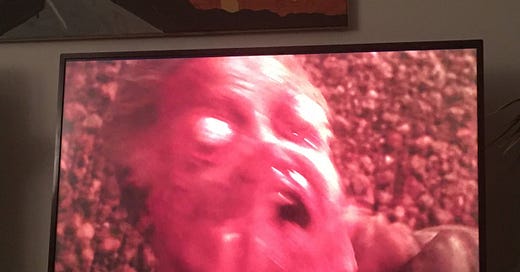I recall reading some years ago a book by the Italian philosopher Franco Berardi. What is attractive to me about his thought is precisely the thing that others hate — that he is a far from systematic thinker. To my mind, that is a plus, but then I have a far from systematic mind. He is in good company. Walter Benjamin, Simone Weil, John Berger and so on are far from systematic, but rather are generative, responsive, productive. They put their mind to work on the contextualisation, and hence the concretisation, of the shifting moment of experience. How did I end up thinking this? they seem to ask.
Back to the book. It was called The Soul at Work. Written well over a decade ago, he attempts to come to some understanding of how then-novel digital consumer technologies like smartphones were starting to affect us, as workers, consumers, humans —distinctions that are becoming increasingly thin. After all, we now all make value from the moment we wake, laying on our side in bed, scrolling in the dark with only our faces illuminated by the data we produce, the statistical information on our own desires selling for fractions of a cent per click, our fingers sliding across adverts, a few fractions more. It is a mirage of consuming, a mirage of producing, of course. Advertising, the motor of the internet, is a fiction. We are producing value without having bought or consumed a single thing; it is our attention we are selling. Internet advertising is woefully ineffective, even when it is working properly, but in reality, most clicks sold are not from us desiring flesh-sacs anyway, but by fraudulent automatons clicking away. The process of buying and selling ads tailored to demographics is so convoluted, so opaque, however, that the advertisers paying the agencies to push their product will never know which of the clicks comes from bloodless robo-battery hens in click farms, and which come from us real life cognitive bed-ridden masturbating Skinner rats. It doesn’t matter: it’s in nobody’s best interest, at the moment, to acknowledge that it’s a bubble, and it will keep expanding until it pops.
And it doesn’t even matter for us; these moments of attention we sell soon have their influence on us, and even if it makes no money, it makes our culture. It’s estimated that we see over 10,000 adverts a day, double what we saw prior to the invention of the smartphone, and the endless shit we’re pouring into our brains is no less influential than stuff we actively seek out. It all acts upon us, morphs our vision and accretes as our desire. As Benjamin wrote, “what, in the end, makes advertisements superior to criticism? Not what the moving red neon says —but the fiery pool reflecting it in the asphalt.” Our faces, in this metaphor, are the asphalt.
Listen to this episode with a 7-day free trial
Subscribe to Huw Lemmey's 'Utopian Drivel' to listen to this post and get 7 days of free access to the full post archives.











